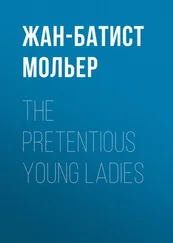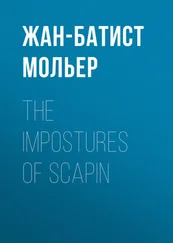Жан-Батист Мольер - The Blunderer
Здесь есть возможность читать онлайн «Жан-Батист Мольер - The Blunderer» — ознакомительный отрывок электронной книги совершенно бесплатно, а после прочтения отрывка купить полную версию. В некоторых случаях можно слушать аудио, скачать через торрент в формате fb2 и присутствует краткое содержание. Жанр: foreign_antique, foreign_prose, foreign_dramaturgy, на английском языке. Описание произведения, (предисловие) а так же отзывы посетителей доступны на портале библиотеки ЛибКат.
- Название:The Blunderer
- Автор:
- Жанр:
- Год:неизвестен
- ISBN:нет данных
- Рейтинг книги:3 / 5. Голосов: 1
-
Избранное:Добавить в избранное
- Отзывы:
-
Ваша оценка:
- 60
- 1
- 2
- 3
- 4
- 5
The Blunderer: краткое содержание, описание и аннотация
Предлагаем к чтению аннотацию, описание, краткое содержание или предисловие (зависит от того, что написал сам автор книги «The Blunderer»). Если вы не нашли необходимую информацию о книге — напишите в комментариях, мы постараемся отыскать её.
The Blunderer — читать онлайн ознакомительный отрывок
Ниже представлен текст книги, разбитый по страницам. Система сохранения места последней прочитанной страницы, позволяет с удобством читать онлайн бесплатно книгу «The Blunderer», без необходимости каждый раз заново искать на чём Вы остановились. Поставьте закладку, и сможете в любой момент перейти на страницу, на которой закончили чтение.
Интервал:
Закладка:
Dryden has imitated The Blunderer in Sir Martin Mar-all; or the Feigned Innocence , first translated by William Cavendish, Duke of Newcastle, and afterwards adapted for the stage by "glorious John." It must have been very successful, for it ran no less than thirty-three nights, and was four times acted at court. It was performed at Lincoln's Inn Fields by the Duke of York's servants, probably at the desire of the Duke of Newcastle, as Dryden was engaged to write for the King's Company. It seems to have been acted in 1667, and was published, without the author's name, in 1668. But it cannot be fairly called a translation, for Dryden has made several alterations, generally not for the better, and changed double entendres into single ones. The heroine in the English play, Mrs. Millisent, (Celia), marries the roguish servant, Warner (Mascarille), who takes all his master's blunders upon himself, is bribed by nearly everybody, pockets insults and money with the same equanimity, and when married, is at last proved a gentleman, by the disgusting Lord Dartmouth, who "cannot refuse to own him for my (his) kinsman." With a fine stroke of irony Millisent's father becomes reconciled to his daughter having married a serving-man as soon as he hears that the latter has an estate of eight hundred a year. Sir Martin Mar-all is far more conceited and foolish than Lelio; Trufaldin becomes Mr. Moody, a swashbuckler; a compound of Leander and Andrès, Sir John Swallow, a Kentish knight; whilst of the filthy characters of Lord Dartmouth, Lady Dupe, Mrs. Christian, and Mrs. Preparation, no counterparts are found in Molière's play. But the scene in which Warner plays the lute, whilst his master pretends to do so, and which is at last discovered by Sir Martin continuing to play after the servant has finished, is very clever. [Footnote: According to Geneste, Some Accounts of the English Stage , 10 vols., 1832, vol. i., p. 76, Bishop Warburton, in his Alliance of Church and State (the same work is mentioned in Note 2), and Porson in his Letters to Travis alludes to this scene.] Dryden is also said to have consulted l'Amant indiscret of Quinault, in order to furbish forth the Duke of Newcastle's labours. Sir Walter Scott states in his introduction: "in that part of the play, which occasions its second title of 'the feigned Innocence,' the reader will hardly find wit enough to counterbalance the want of delicacy." Murphy has borrowed from The Blunderer some incidents of the second act of his School for Guardians , played for the first time in 1767.
DRAMATIS PERSONAE
[Footnote: Molière, Racine, and Corneille always call the dramatis personae acteurs , and not personnages .]
LELIO, son to PANDOLPHUS.
LEANDER, a young gentleman of good birth .
ANSELMO, an old man .
PANDOLPHUS, an old man .
TRUFALDIN, an old man .
ANDRÈS, a supposed gipsy .
MASCARILLE, servant to Lelio .
[Footnote: Mascarille is a name invented by Molière, and a diminutive of the Spanish mascara , a mask. Some commentators of Molière think that the author, who acted this part, may sometimes have played it in a mask, but this is now generally contradicted. He seems, however, to have performed it habitually, for after his death there was taken an inventory of all his dresses, and amongst these, according to M. Eudore Soulié, Recherches sur Molière , 1863, p. 278, was: "a … dress for l'Étourdi , consisting in doublet, knee-breeches, and cloak of satin." Before his time the usual name of the intriguing man-servant was Philipin .]
ERGASTE, a servant .
A MESSENGER.
Two Troops of Masqueraders .
CELIA, slave to TRUFALDIN.
HIPPOLYTA, daughter to ANSELMO.
Scene . – MESSINA.
ACT I
SCENE I. – LELIO, alone
LEL. Very well! Leander, very well! we must quarrel then, – we shall see which of us two will gain the day; and which, in our mutual pursuit after this young miracle of beauty, will thwart the most his rival's addresses. Do whatever you can, defend yourself well, for depend upon it, on my side no pains shall be spared.
SCENE II. – LELIO, MASCARILLE
LEL. Ah! Mascarille!
MASC. What's the matter?
LEL. A great deal is the matter. Everything crosses my love. Leander is enamoured of Celia. The Fates have willed it, that though I have changed the object of my passion, he still remains my rival.
MASC. Leander enamoured of Celia!
LEL. He adores her, I tell you.
[Footnote: In French, tu, toi , thee, thou, denote either social superiority or familiarity. The same phraseology was also employed in many English comedies of that time, but sounds so stiff at present, that the translator has everywhere used "you."]
MASC. So much the worse.
LEL. Yes, so much the worse, and that's what annoys me. However, I should be wrong to despair, for since you aid me, I ought to take courage. I know that your mind can plan many intrigues, and never finds anything too difficult; that you should be called the prince of servants, and that throughout the whole world…
MASC. A truce to these compliments; when people have need of us poor servants, we are darlings, and incomparable creatures; but at other times, at the least fit of anger, we are scoundrels, and ought to be soundly thrashed.
LEL. Nay, upon my word, you wrong me by this remark. But let us talk a little about the captive. Tell me, is there a heart so cruel, so unfeeling, as to be proof against such charming features? For my part, in her conversation as well as in her countenance, I see evidence of her noble birth. I believe that Heaven has concealed a lofty origin beneath such a lowly station.
MASC. You are very romantic with all your fancies. But what will Pandolphus do in this case? He is your father, at least he says so. You know very well that his bile is pretty often stirred up; that he can rage against you finely, when your behaviour offends him. He is now in treaty with Anselmo about your marriage with his daughter, Hippolyta; imagining that it is marriage alone that mayhap can steady you: now, should he discover that you reject his choice, and that you entertain a passion for a person nobody knows anything about; that the fatal power of this foolish love causes you to forget your duty and disobey him; Heaven knows what a storm will then burst forth, and what fine lectures you will be treated to.
LEL. A truce, I pray, to your rhetoric.
MASC. Rather a truce to your manner of loving, it is none of the best, and you ought to endeavour.
LEL. Don't you know, that nothing is gained by making me angry, that remonstrances are badly rewarded by me, and that a servant who counsels me acts against his own interest?
MASC. ( Aside ). He is in a passion now. ( Aloud ). All that I said was but in jest, and to try you. Do I look so very much like a censor, and is Mascarille an enemy to pleasure? You know the contrary, and that it is only too certain people can tax me with nothing but being too good-natured. Laugh at the preachings of an old grey-beard of a father; go on, I tell you, and mind them not. Upon my word, I am of opinion that these old, effete and grumpy libertines come to stupify us with their silly stories, and being virtuous, out of necessity, hope through sheer envy to deprive young people of all the pleasures of life! You know my talents; I am at your service.
LEL. Now, this is talking in a manner I like. Moreover, when I first declared my passion, it was not ill received by the lovely object who inspired it; but, just now, Leander has declared to me that he is preparing to deprive me of Celia; therefore let us make haste; ransack your brain for the speediest means to secure me possession of her; plan any tricks, stratagems, rogueries, inventions, to frustrate my rival's pretensions.
Читать дальшеИнтервал:
Закладка:
Похожие книги на «The Blunderer»
Представляем Вашему вниманию похожие книги на «The Blunderer» списком для выбора. Мы отобрали схожую по названию и смыслу литературу в надежде предоставить читателям больше вариантов отыскать новые, интересные, ещё непрочитанные произведения.
Обсуждение, отзывы о книге «The Blunderer» и просто собственные мнения читателей. Оставьте ваши комментарии, напишите, что Вы думаете о произведении, его смысле или главных героях. Укажите что конкретно понравилось, а что нет, и почему Вы так считаете.












